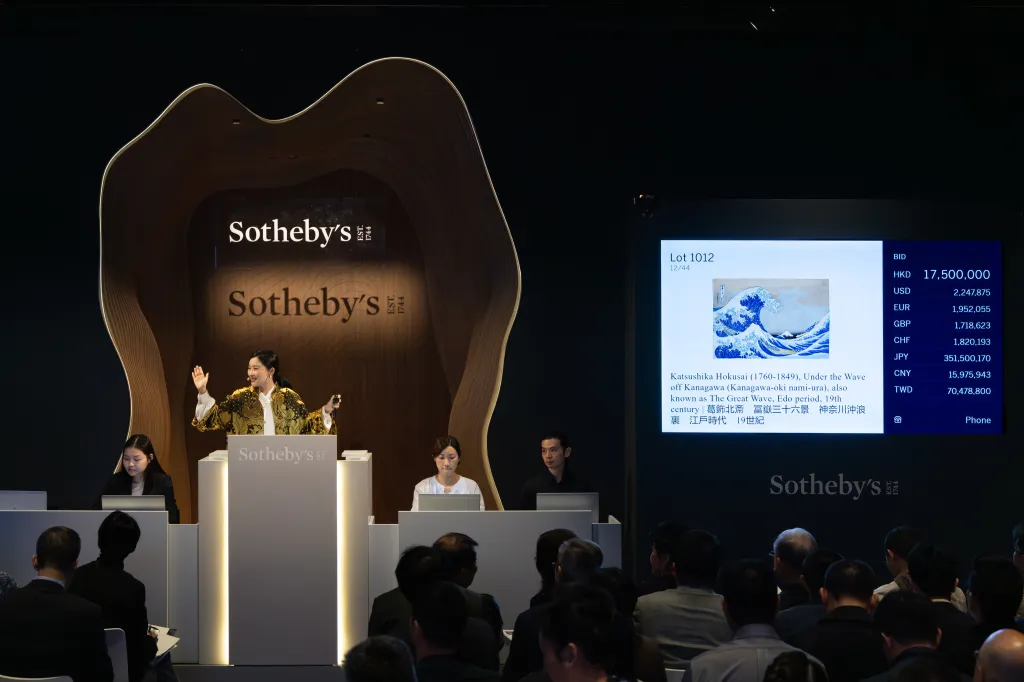A total of 125 major works from Japan’s Okada Museum of Art hit the auction block at Sotheby’s Hong Kong on Saturday, achieving white-glove status (meaning all works sold). The sale netted the equivalent of $88 million (plus fees) and set two auction records for Japanese artists Kitagawa Utamaro and Hokusai. Sotheby’s told ARTnews that the collection was “estimated in excess of $50 million.”
The result should satisfy Kazuo Okada, the museum’s founder, who sold the artworks to settle a $50 million legal bill that stems from his long-running feud with casino magnate Steve Wynn, 83. Okada, an 83-year-old billionaire, is the former chairman of Tokyo-based Universal Entertainment Corp.
Nicolas Chow, Sotheby’s Asia chairman and worldwide head of Asian art, told ARTnews before the sale that “it is the most significant collection of East Asian art to come to auction in recent memory.”
Utamaro’s Fukagawa in Snow, painted in the early 19th century, was the night’s top lot, selling to a Japanese private collector for $7.1 million, with over 30 bids placed.
Hokusai’s iconic The Great Wave Off the Coast of Kanagawa (1830-32) almost tripled its high estimate to sell for $2.8 million, also to a Japanese private collector. During an 8-minute battle, more than 20 bids were placed on the work, which is arguably the world’s most famous Japanese woodblock print. It is part of Hokusai’s prized “Thirty-Six Views of Mount Fuji” series. London’s British Museum owns three works from the series, the Metropolitan Museum of Art has four, and the Maidstone Museum in the UK has one.
Of the 125 works, 19 sold for over $1.2 million, including an important surviving relic called Ya Yi fanglei from one of the most prominent clans in the late Shang dynasty ($4.9 million); a doucai gilt-decorated “bajixiang” vase from the Qianlong period ($4.3 million); and a celadon-glazed lotus-mouth bottle vase from the Yongzheng period ($3.9 million).
“The sale captivated collectors worldwide, from Japan and China, to Europe and the US, igniting fierce competition and achieving auction records, culminating in a white-glove result,” Chow told ARTnews after the auction. “This vibrant finale to the Hong Kong Asian art sales series this season sends a strong signal for the Asian art market. It reaffirms the unwavering dedication of both seasoned and new connoisseurs who are always ready to compete for works of such caliber.”
Decades ago, Wynn and Okada became friends and founded the Las Vegas-based hotel-casino operator Wynn Resorts together in 2002. However, relations soured a few years later when they accused one another of questionable payments to public officials in Asia. In 2012, Okada was ousted as Wynn Resorts’ vice-chairman, and the company redeemed Universal Entertainment Corp’s 20 percent stake in the business at a discount. The latter disputed the redemption amount in court, and Okada eventually prevailed in 2018, reaching an out-of-court settlement in which Wynn and Wynn Resorts agreed to pay $2.6 billion.
When Okada’s law firm, Bartlit Beck, sent him its $50 million bill, though, he claimed it was too hefty. The firm successfully pursued it in a binding court arbitration, and Okada now needs to pay.
Located in forest surrounding the mountain region of Hakone in Japan’s Fuji-Hakone-Izu National Park west of Tokyo, the Okada Museum opened in 2013.
